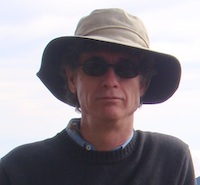About this book
The poems in this book speak, as members of the First Nations might speak, of the cultures, values, and experiences of many tribes, the Achumawi, Atsugewi, Bear River, Cupeño, Hupa, Kato, Karuk, Klamath, Konkow, Kumeyaay, Luiseño, Maidu, Miwok, Mohave, Modoc, Nisenan, Nomlaki, Pomo, Paiute, Quechan, Shasta, Wintu, Wiyot, Yuki, Yurok, and Yokuts. They are inspired by ethnological records, but are not intended to be accurate descriptions of tribal heritages, for the poet is not speaking for the Mohawk, Miwok, or Mohave people, but for himself.
Notes and sources
The primary source of these words is my spirit of identity, as a person of Native American heritage and member of the Seldovia Village Tribe of Alaska, living in Seattle. When my words do not ring true, blame is due only to me. Otherwise, I have derived inspiration and details from the following sources.
Unangan Suite
My main source for these thoughts has been Aleuts: Survivors of the Bering Land Bridge, by William S. Laughlin, NY: Hold, Rinehart and Winston, 1980.
I have borrowed lines and ideas from my own poem “Family” in The Great Ideas. That, and my own feelings, such as expressed in my poem “Grace” in The I Ching.
Unangan is the singular form of the word meaning “people” in the language spoken on the Aleutian Islands, by the people otherwise known as Aleuts.
Fishing Rights Suite
I have been most inspired by Chief Chief Seattle’s 1854 oration and the findings of Judge George H. Boldt in 1974. In addition, many tribes have good websites, the Duwamish, Suquamish, Skokomish, Puyallup, Jamestown S'Kallam, and Makah tribes. I also found the original treaties and articles about these:
- Treaty of Medicine Creek - 26 December 1854
- Treaty of Point Elliott - 22 January 1855
- Treaty of Point No Point - 26 January 1855
- Treaty with the Nisqualli, Puyallup, etc., 1854 (Medicine Creek Treaty)
- Treaty with the Dwamish, Suquamish, etc., 1855 (Point Elliott Treaty)
- Treaty with the Makah, 1855 (Neah Bay Treaty)
- Treaty with the Yakama, 1855
Water Rights Suite
- Lakes, rivers, and dams:
- Klamath River
- Klamath Basin
- Trinity River
- Klamath River Hydroelectric Project
- Lake Ewauna
- Link River Dam
- John C. Boyle Dam
- Copco Lake
- Iron Gate Dam (California)
- Lewiston Lake
- The Oregon Encyclopedia:
- Klamath River Hydroelectric Project
- Klamath River: Project Overview, PacifiCorp
- Saving the Salmon: Feds, States, Tribes Ink Plan to Demolish Four Klamath River Dams, Terri Hansen, Indian County Media Network
- Tribes:
- Treaty with the Chasta, etc., 1853
- Treaty with the Klamath, etc., 1864
- Klamath Basin Restoration Agreement
- Upper Klamath Basin Comprehensive Agreement, 18 April 2014
California Suite
I have based these poems on the stories and commentary in The Way We Lived, edited by Malcolm Margolin.
Unlike the poems in the Unangan Suite, these poems do not represent a people with a unified culture. The names we use for them, such as “Pomo,” may span people with different customs and different dialects. The concept of a California native people is entirely modern and political. Also, these poems represent only a small fraction of the over five hundred tribes that lived in California.
The Ketoowah
The Four Mothers were the four tribes who lived in the east before the Cherokee moved there. I derived these verses from three translations of a talk by Bill Bolin and some information from Sam Chadoin given to me by Albert Wahrhaflig, James Mooney’s history, and the Swimmer Manuscripts.
Links and shortcuts
In any page, you can click on or touch links to jump around in this book.
- Each entry in the contents links to the poem.
- The title for a poem links back to the contents, highlighting the entry for the poem.
- Words in the headers and footers link to the index, the contents, a listing of books by the author, to this page, and to the previous and next poems in the book.
You may find the following keyboard equivalents to be convenient. Here I use the symbol ⌥ for the option key on Mac/OS or the alt key on Windows, ⇧ for the shift key, and ⏎ for the return (enter) key. Arrow keys are ◄ (left), ► (right), ▲ (up), and ▼ (down).
| Context | Keys | Jump to / Behavior |
|---|---|---|
| cover | ⌥ ◄ | Books by Tom Sharp |
| ⌥ ▲ | About Tom Sharp | |
| ⌥ ► | about this book (this page) | |
| ⌥ ▼ | contents | |
| ⇧ ⌥ ▼ | contents | |
| contents | ⇧ ⌥ ▲ | cover |
| ⌥ ▼ | select the next item in the contents | |
| ⌥ ▲ | select the previous item in the contents | |
| ⌥ ► | open the selected page | |
| ⌥ ⏎ | open the selected page | |
| poem | ⇧ ⌥ ▲ | contents |
| ⌥ ◄ | contents | |
| ⌥ ▲ | open the previous page | |
| ⌥ ▼ | open the next page |
The poet

Tom Sharp is a Native American of Aleut heritage, a member of Seldovia Village Tribe. He is the author of numerous books, including Spectacles: A Sampler of Poems and Prose, Taurean Horn Press (ISBN 0-931552-10-9), a novel, Hans and the Clock (ISBN 979-8580172484), The book of science, SciFi (ISBN 979-8694935210), Things People Do (ISBN 979-8687425568), The book of beliefs (ISBN 979-8683553593), The I Ching (ISBN 979-8573510620), Images (ISBN 979-8577560515), Aleut Artifacts (ISBN 979-8575608998), and Aleut Words (ISBN 979-8582103394).
You may email tom/AT/liztomsharp/DOT/-c-o-m-/ to share comments on this work.

 First Nations
First Nations